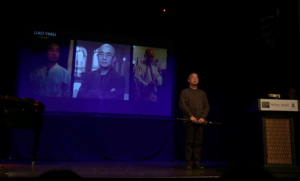Acceptance Speech for the 2018 Annual Disturbing the Peace Literary Prize for a Courageous Writer at Risk
Source: China Change / www.chinachange.org / By Liao Yiwu /
I thank the award committee for conferring this honor upon me. The award is named for Vaclav Havel’s first work, his autobiography Disturbing the Peace. When translated into Chinese, however, the title of this work means about the same as “provoking trouble” (寻衅滋事). During the existence of the Czechoslovak communist regime, and under the rule of the Chinese Communist Party (CCP), many dissidents have been sentenced for these “crimes”.

When the Tiananmen Square massacre of 1989 occurred, I wrote and recorded my poem “Massacre” (《大屠殺》). As the final line goes, “Faced with this unprecedented slaughter, the only survivors are the sons of bitches.” For this “disturbance of the peace” I got four years in prison, where I tried to kill myself twice. Instead of dying, I started writing as a witness, and I have not stopped since. Ten years ago, my work The Corpse Walker (《吆尸人》), which was translated by Huang Wen (黃文), again disturbed the peace.
In 2011, I bribed a triad organization to smuggle me to Vietnam. My sole aim in escaping China was to be able to publish the autobiography that I wrote in prison. I have spent the last seven years in Germany as a political asylee. I still don’t know much German, but Fischer has published eight of my books in the German language. My next book to be published in German next year will be Mr. Wang, the Man In Front of the Tanks (《王先生,挡在坦克前面的那个人》), and in it, there will be an essay titled Liu Xiaobo: The Final Days (《刘晓波的最后时刻》). It is about his persistence and our failure.
At the moment, Liu Xia (刘霞) and I are here, but her late husband Liu Xiaobo (刘晓波) and Havel have gone to a faraway place. They have finally met each other in Heaven. Two Charters, drafted by two honest men. A few days ago, before we came to New York, Liu Xia and I travelled to Prague to visit Vaclav’s younger brother Ivan. I wonder, are we still “disturbing the peace”?
I have been disturbed as well. The day after Liu Xia arrived in Germany in July, China sentenced another dissident, Qin Yongmin (秦永敏) of Hubei Province, to 13 years in prison. He has been in jail twice and is 65 years old now. Not long ago, it was reported that in my hometown of Chengdu, Sichuan, Huang Qi (黃琦), a 55-year-old dissident who founded the “64tianwang.com” [a site dedicated to documenting social injustice], suffered from kidney failure in prison and is on the verge of death. His 80-year-old mother published his will, and pleaded that “Huang Qi is not guilty”.
Havel once had a round of debates with writer Milan Kundera about protests, politics, prison, and forgetting. What meaning is there to it all? Will Qin Yongmin and Huang Qi walk out of prison alive? And if they don’t, who will record their stories? It’s not something I can do, because unlike Liu Xia and Liu Xiaobo, I don’t know enough about them or the things they have experienced.
Besides, I’ve recorded so much, but has it changed anything? New crimes are committed and simply bury the old ones.
Still, I have to keep writing.
Before I stepped onto the stage to accept my award, I found Ms. Albright and Mr. Kissinger, two former U.S. Secretaries of State, in the audience. You still have influence in China. I hope you will pay attention to the aforementioned Qin Yongmin and Huang Qi, and put pressure on the Chinese government for their release.
(Note: As a friend of Vaclav Havel, Ms. Albright accepted the Czechoslovakian Democratic Transition Commemorative Award from the Vaclav Havel Library Foundation. In her acceptance address, she expressed congratulations to Liao Yiwu for receiving the award and said, in acknowledging his request, that when she visits China, she will definitely place a request with top CCP leaders to release the two political prisoner.)

